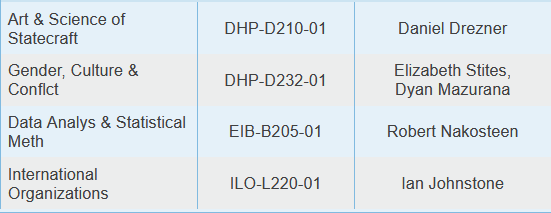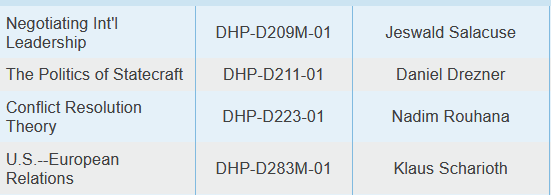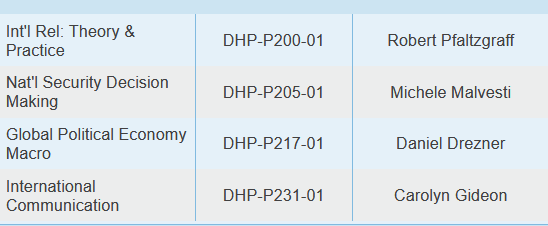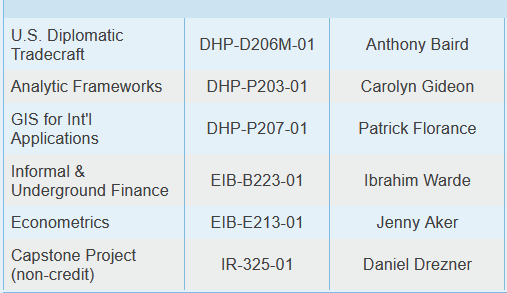Kaitlyn’s annotated curriculum
Our final “annotated curriculum” post comes from Kaitlyn:
Pre-Fletcher Experience
Teaching in the Czech Republic and France and as a volunteer with AmeriCorps
Capstone Topic
Investigating Perceptions of US Power and Decline from 1957 to the Present
Curriculum Overview
MALD students are required to complete the breadth requirement: 3 credits in the International Law and Organization (ILO) division, 6 from Diplomacy, History, and Politics (DHP), and 3 from Economics and International Business. They’re further required to pass the quantitative and economics exams or take 3 credits of a statistics or economics course. Finally, they must complete two fields of study (generally 9-12 credits depending on the field).
Extra-Curricular Activities
Part time work with the Tufts Literacy Corps and volunteering with the Girl Scouts of New England
Semester One

My first semester, I prioritized getting my statistics requirement out of the way. I’d always been good at math, but I’d never taken a stats course, and I had in mind that I wanted to study Econometrics in my second year so this was a good one to get done first. It meant I couldn’t take International Negotiation (bummer) but I was happy to get the core quantitative requirement finished.
All the courses my first semester satisfied some part of Fletcher’s breadth requirement. Two (Gender Culture and Conflict, and Art and Science of Statecraft) doubled as courses in my two concentrations.
Of the four, Art and Science of Statecraft was my favorite class – the professor (Daniel Drezner) had a great lecture style and the work I did in the course inspired the topic I later chose for my Capstone project.
Semester Two
(This was the semester everyone’s jaws dropped when they saw my course list…)


Every MALD student is allowed one semester where they take up to 13.5 credits instead of 12. In this case, one of the three module courses I took in Spring 2018 (Negotiating Leadership, US-EU Relations, and Civil Resistance) counted as that extra 1.5 credits. This freed me up to take a lighter load (10.5 credits) during 1 semester of my second year. I was very thankful I had that option because there were just too many interesting classes! I was glad I didn’t have to choose between them.
By far the most interesting classes I took this semester were Politics of Statecraft and Civil Resistance. The first, a 15-student seminar with many in-class simulations and discussions, was a lively and exciting continuation of what we had learned in Art and Science of Statecraft (you have to take the first to take the second). The second, Civil Resistance, focused on non-violent verses violent revolutions. I loved it – and not just because the midterm project was a video game (although that was a very exciting deviation from paper writing).
The most useful class was US-EU Relations. It discussed the relationships between the US, EU, and Russia since the end of the Cold War. The professor, a former ambassador, assigned us oral presentations and memo-writing assignments that developed practical, professionally useful skills. His feedback was incredibly useful to me as a student interested in pursuing a diplomatic career.
Semester Three

This was the semester I completed the last two classes for my Fields of Study. It’s impossible to choose any class that was my favorite or the most useful. Every class from Fall 2018 was challenging and exciting. National Security Decision Making and Global Political Economy both helped me develop my Capstone thesis. And International Communications was a worthwhile elective. I always like at least one class where I can expand my knowledge base beyond the focus of my two concentrations. Communications policy is one of those critical issues for the 21st century that I’m grateful I had the opportunity to study (although be warned – the course has made me incredibly paranoid about effective tech-industry regulation and data protection. I’ll never look at Google the same way again).
Semester Four

This semester I scaled back on my course load – three full courses, an audit, and a module class. The module wrapped up in February, leaving me a little extra time to focus on my Capstone. The bulk of the work for my full semester courses was quantitative or software based – meaning the only major writing assignment I’ve had this semester has been the Capstone thesis. It was a wise and necessary choice – the Capstone has been a time consuming if exciting project.
I’ve been told by peers that they can’t fathom why I took Econometrics as an elective. So they’ll be further mind-boggled that more than being an academically challenging course it’s also turned out to be my favorite. I haven’t gotten to exercise my quantitative brain since high school Calculus and I’m having fun being in a math class that challenges me and am learning how to use STATA as part of the course. I also love how collaborative the course assignments are. My study group has worked well together and even the most challenging assignments have been enjoyable.
I also want to talk about Diplomatic Tradecraft, Fletcher’s newest module course. It’s taught by the State Department fellow and the course assignments – and instructor’s feedback, were geared towards giving students experience writing cables and policy recommendations that one would do at the State Department. 10 out of 10 would recommend.
So here we are. Three weeks left. Three finals to go. In reflecting on the path I’ve taken at Fletcher, I feel that I’ve balanced the courses I’ve taken for my fields of study with electives that gave me a more holistic perspective and that helped me develop practical writing and computer skills. Most importantly, I’m confident that I’ve gotten the most out of my time at Fletcher.
Now? I’m going to go back to finishing my Capstone and getting excited for graduation.